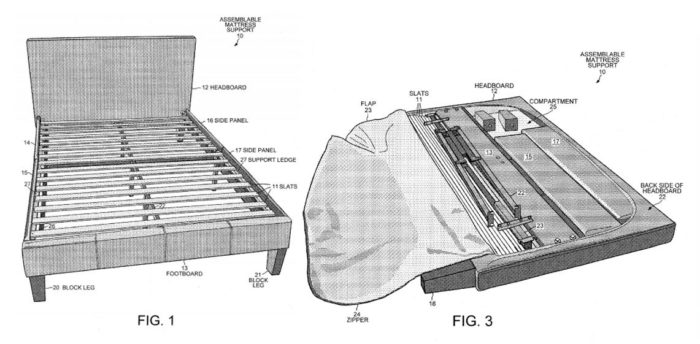by Dennis Crouch
Cap Export LLC v. Zinus Inc. (Fed. Cir. 2021)
Zinus is the owner of U.S. Patent No. 8,931,123, which covers a particular bed frame that can assembled at home. A key feature of the invention is that back-side of the headboard includes a zippered compartment that can hold all of the pieces. Rather than simply a bed-in-a-box, it is a bed-in-a-headboard.
The district court first sided with the patent challenger and awarded sua sponte summary judgment of obviousness based upon a bed-in-a-box reference. That decision was vacated by the Federal Circuit in a 2018 non-precedential decision since Zinus lacked notice and an opportunity to present evidence prior to the summary judgment determination. On remand, the district court reversed itself — awarding summary judgment the other way — that the bed-in-a-box reference did not invalidate. The court entered final judgment, awarding $1.1 million in damages and issued a permanent injunction.One problem: The president of Zinus (Colin Lawrie) had given false testimony regarding the prior art (Lawrie was testifying both as a fact witness and a testifying technical expert). In particular, Lawrie testified that he had never “seen a bed that was shipped disassembled in one box.” Later, Lawrie testified again and explained that his original testimony was “incorrect” but that at the time he was not intending to answer falsely. In particular, it turned out that a Zinnus-related company had purchased/sold hundreds of beds in boxes that had not been found by Cap’s prior art searchers. Lowrie’s later explanation was that he was focusing on the novel features of his company’s patent — a bed shipped disassembled with all of the components in the headboard. The district court found Lourie’s explanation “wholly implausible.”
After learning of the falsity, Cap filed a R. 60(b) motion — asking the court to reconsider the case based upon the patentee’s fraud on the court.
On motion and just terms, the court may relieve a party or its legal representative from a final judgment, order, or proceeding for the following reasons: . . . (3) fraud, misrepresentation, or misconduct by an opposing party;
FRCP 60(b). The district court complied and set-aside the judgment. The court found that Lawrie’s statements – as president of the company – counted as fraud by the party itself. On appeal, the Federal Circuit has affirmed.
Fraud on the court does not require that the party show that the outcome would change but-for the fraud. In this case, there is some dispute about whether the prior sales would invalidate the patent. Here, it was enough to show that the fraud was material to central issues in the case.
In its conclusion, the Federal Circuit reached back to the hey-day of patent invalidation/unenforceability decisions from the Supreme Court in holding that the rules regarding fraud-on-the-court are particularly important in the patent infringement context:
“It is the public interest which is dominant in the patent system.” Mercoid Corp. v. Mid-Continent Inv. Co., 320 U.S. 661 (1944). “The far-reaching social and economic consequences of a patent . . . give the public a paramount interest in seeing that patent monopolies spring from backgrounds free from fraud or other inequitable conduct and that such monopolies are kept within their legitimate scope.” Precision Instrument Mfg. Co. v. Auto. Maint. Mach. Co., 324 U.S. 806 (1945). The functioning of the patent system requires that “everything that tends to a full and fair determination of the matters in controversy should be placed before the court.” Keystone Driller Co. v. Gen. Excavator Co., 290 U.S. 240, 244 (1933) (quoting 1 Joseph Story, Commentaries on Equity Jurisprudence § 98 (W.H. Lyon, Jr. ed., 14th ed. 1918)). Here, Lawrie, Zinus’s president and expert witness, misrepresented his knowledge of highly material prior art. The district court properly declined to condone such conduct. The district court did not abuse its discretion in granting the motion to vacate the judgment under Rule 60(b)(3), and we affirm.
Slip Op.
"lose" - Google News
May 06, 2021 at 03:18PM
https://ift.tt/3tjAGa1
Corporate Lies Lose Patentee Million Dollar Verdict. - Patently-O
"lose" - Google News
https://ift.tt/3fa3ADu https://ift.tt/2VWImBB
Bagikan Berita Ini















0 Response to "Corporate Lies Lose Patentee Million Dollar Verdict. - Patently-O"
Post a Comment